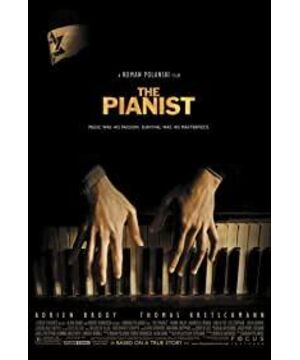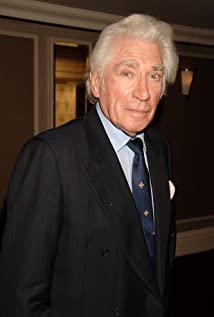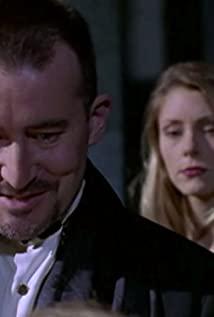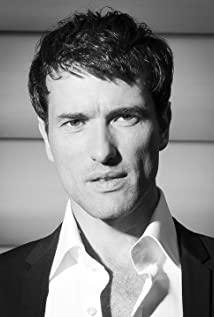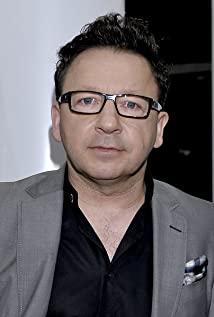In the shadow of human glory, I have always had a special feeling for Jews, similar to the feelings of patients. This may be due to the sufferings of all of us in the war. Watching movies about the Holocaust, I couldn't help changing the race to Chinese, so I always watch these kinds of movies as a personal witness. This kind of movie viewing experience brings a deeper touch. This film tells the story of a pianist. The whole film brings the pianist's unique literary and romantic temperament. This feeling comes from the expression of the characters' feelings, from the use of the soundtrack, and from the processing of tones. After watching this movie, it was like enjoying a classical concert. The director performed gracefully on the stage. We listened carefully in the audience. There was no noise except the sound of music. When the performance was over, the director quietly left. , And we are still silently aftertaste. The director told us what happened objectively and calmly, without strong ideology, without intense personal feelings, and without inciting national sentiments. He just calmly showed what happened in that period of history. He didn't tell us clearly what he wanted to express. This film is more like a documentary, recording a person's survival process, the director did not add too many other elements to it, in fact, this film is indeed an adaptation of a real story. The movie never escapes from cruel scenes, and shots splashed with blood frequently appear on the spot. Such a true and calm film directly reveals the bloody reality, without adding any oil and jealousy, but only allows people to face that period of history directly, so that the viewer can think independently from it without being affected by other concepts. Some people say that the pianist can survive only by luck. The tone seems extremely disdainful, but in such a war age and in such a distressed situation, what can ordinary people expect besides luck? Luck is so important in the war years. It is more important than any moment in the past. Life is extremely fragile, bullets, hunger, cold, and germs can easily kill hundreds of people. So when the German officer rescued the protagonist and the protagonist thanked him, he said that the protagonist should be grateful not to him but to God. God is another name for luck, and thanking God is just thanking luck. He survived because he shouldn't have died. There are not so many reasons. The lives of people in the war are no longer in their own hands. It is because of this unpredictable life that people will sigh: I would rather be a peaceful dog than a chaotic person. Speaking of the characters in the movie, the three people that impressed me the most. The old man in a wheelchair, the German officer who rescued the protagonist, and the protagonist himself. If I were to choose the scene that shocked me the most in this film, I would not hesitate to choose the scene of the tragic death of the elderly in a wheelchair. In the segregated Jewish quarter, the family is preparing to enjoy Suppress dinner and enjoy this rare peaceful moment of misfortune, but misfortune fell from the sky, and the Nazis slaughtered their whole family just for fun. The old man in a wheelchair was the first to be killed. He was sitting at the table, tremblingly preparing for dinner, and then the Nazis broke in. The Nazis asked everyone to stand up immediately. He looked helplessly at the wheelchair under his leg, struggling to stand up. His weak arm trembled because of excessive force, but he couldn't stand up in the end. If an elderly person in a wheelchair can stand up, does he still need a wheelchair? Don't the officers know this truth? Of course he knew it, but he just wanted to torture and kill the Jews. The reason was not important. There was nothing wrong with it. As a result, the old man was pushed onto the balcony by the Nazis, and the thin body was lifted by the Nazis and threw them down. He once looked back at his family, but they were silent and looked down at the ground. He hoped his family would come to rescue him, but the family just watched. Is it because the family doesn't want to save him? Of course, the family wanted to save him, but the family did not dare. The cruelty of the Nazis has long been deeply rooted in the hearts of the people. When encountering them, an untortured death like shooting may be the best ending. If this is the first time the Nazis have come to harass them, maybe they will rise up to resist, but they have already witnessed the atrocities of the Nazis, knowing that the results of the resistance will only be more miserable. Obediently, there may be a silver lining. So the Jews have been oppressed in this way. With a fluke, they still have a glimmer of hope for the human nature of the Nazis. In the movie, there is an old Jew who said not to resist violence. He took it for granted that the Nazis would not kill them casually. After all, they are also labor force and have use value. He was wrong. The Nazis only wanted to exterminate the Jews. Only by resistance can they save themselves. It would be foolish to leave their fate to the perpetrator to decide. Blindly obedience can only fuel the arrogance of evil. In the end, this family was slaughtered by the Nazis. Humans kill animals to obtain food and leather, but humans kill humans only for pleasure. The killing between humans is far more cruel than animals. The madness after the complete release of human nature shocked me. Human beings no longer fear life. Human life may be the cheapest thing at that time. The German military officer is a complicated character, and the director did not assume that he was also a brutal man because of his Nazi status. It is not the Nazis, it must be cruel, and this is in line with the real reality. No one is absolutely evil or absolutely good. He rescued the protagonist. After being captured, he begged the protagonist’s friend to come here to rescue him, but when the protagonist arrived, he only saw an empty meadow. Later, the movie mentioned that he died in a Soviet prisoner of war camp in 1952. year. In terms of performance in the movie, I think he He was a poor man, and even sympathized with him. After all, he helped the protagonist, but we don’t know what he did as a Nazi officer. Perhaps one of the documents he signed in the movie confirmed the release of poison gas from the concentration camp, which we have no way of knowing. If the protagonist is still there when he arrives, is he worth saving? No snowflake is innocent in an avalanche. This sentence seems to be applicable to him, but there is a little difference. Snow cannot choose his position, but he can. He can choose to assist the Jews instead of being a Nazi officer. Maybe he is an officer for the better What about helping the Jews? We have no way of knowing. We cannot believe that he is kind and forgivable because of his rescue of the protagonist, but we cannot directly sentence him to death just because he is a Nazi officer. Is he just or evil? Or both? For this type of person, I think it can only be judged by a fair, just and open post-war trial. Unfortunately, he didn’t wait for such a trial and died. In the prisoner-of-war camp, what kind of person he was has become a secret with his death. Finally, the protagonist. First of all, we must evaluate the actor's acting skills. I think no amount of praise and praise can be used on him. He just appeared on the stage, and besides the pianist, I can't imagine what other profession he can be. His temperament, his demeanor, his words and deeds, especially his eyes, make me feel that he is really the pianist back then, and this movie is actually a real image at that time. The pianist he plays is introverted, reserved and melancholic. In the movie, he does not have too many complicated expressions. The eyes replace the mouth and become the place for his thought expression. His joy, his sorrow, his despair, his hope, and all his inner feelings are released through the eyes. At this time, the eyes really become the windows of the soul. This requires top-level acting skills to express the thoughts and feelings of the characters through the eyes. The actors have such a thorough understanding of the characters’ personality, and such a delicate grasp of the psychology. Everything is handled properly. One less point is dull, and one more point. Exaggerated, the image of the pianist created in this way can be called a screen classic. The actor who plays this classic role, we praise him as the actor. When a person like a pianist who is reserved and introverted, when he can't restrain howling and crying, it shows that his heart is sad to the extreme. The pianist was supposed to take the train arranged by the Nazis for Jews with his family. Although it was a train to death, it was a blessing to be with his family. However, he was rescued while getting in the car. He tried to get in the car again, but it was too late. He walked desperately in the sordid chaos and dead bodies everywhere. On the street, there was a dead silence, because all the Jews had been taken away, and he cried and cried as he walked. Although his family is still alive at this time, he knows that it was a farewell just now. The relatives who have been with him for many years will never be able to see each other again, only he is alone. Life and death came so quickly, without any preparation beforehand, who could have expected that he would suddenly be left alone? His eyes became dim and dull at that time, and there was always darkness and nothingness hidden inside. This is the first and last time a pianist has an emotional outburst in a movie. At the end of the film, the pianist's friend told him that no food supply had ever been transported to the destination of the train, which meant that there was no survivor and his family had passed away. The surviving pianist did not shed tears after listening. He just sat on the grass and watched the setting sun quietly. Maybe the tears of the rest of his life had already shed last time. At the end of the film, he played the piano without expression. He seemed to be more taciturn. I think his words were too pale and weak to bear such a heavy pain. He can only release a little bit of sadness through piano music. . The director's selection of the pianist as the protagonist is also intriguing. Piano music is a beautiful embodiment of the glory of mankind, while the war and slaughter show the gloom of mankind. The strong contrast between the two makes people feel absurd and absurd to the extreme. In the movie, the glory of mankind finally survived the craziest and darkest period in human history, but in reality, how much of the glory of mankind is extinguished in the dark period. Human beings can create extremely beautiful things, and at the same time they can completely destroy these beautiful things. How bright the light is, how dark the shadows below are. Just wish the world peace. By the way, I think the words are too pale and weak to bear such a heavy pain. He can only release a little bit of spiritual sadness through piano music. The director's selection of the pianist as the protagonist is also intriguing. Piano music is a beautiful embodiment of the glory of mankind, while the war and slaughter show the gloom of mankind. The strong contrast between the two makes people feel absurd and absurd to the extreme. In the movie, the glory of mankind finally survived the craziest and darkest period in human history, but in reality, how much of the glory of mankind is extinguished in the dark period. Human beings can create extremely beautiful things, and at the same time they can completely destroy these beautiful things. How bright the light is, how dark the shadows below are. Just wish the world peace. By the way, I think the words are too pale and weak to bear such a heavy pain. He can only release a little bit of spiritual sadness through piano music. The director's selection of the pianist as the protagonist is also intriguing. Piano music is a beautiful embodiment of the glory of mankind, while the war and slaughter show the gloom of mankind. The strong contrast between the two makes people feel absurd and absurd to the extreme. In the movie, the glory of mankind finally survived the craziest and darkest period in human history, but in reality, how much of the glory of mankind is extinguished in the dark period. Human beings can create extremely beautiful things, and at the same time they can completely destroy these beautiful things. How bright the light is, how dark the shadows below are. Just wish the world peace.
View more about The Pianist reviews


